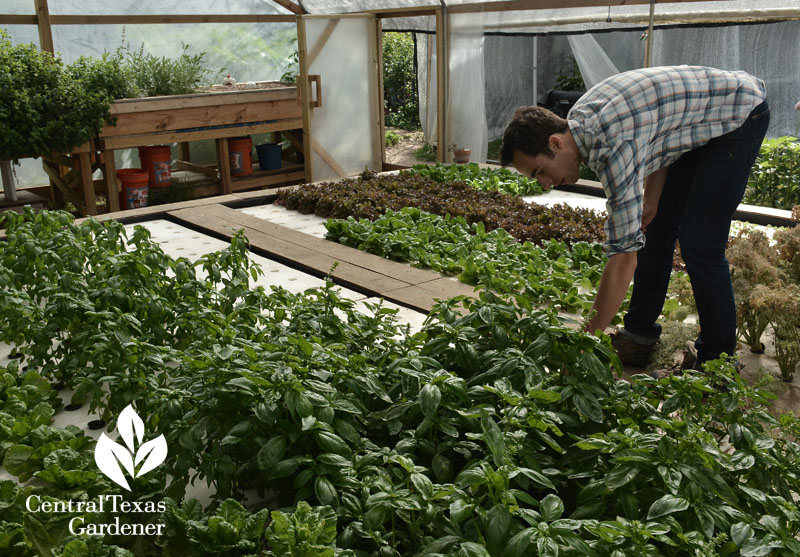July 23, 2015
Farmer Lessons, Succulents, Popsicles
Sometimes we all grouse about the weather and problems in our gardens, but you know what? Whenever I meet a local urban farmer, they’re always upbeat, like Michael Hanan at neighborhood micro-farm Ten Acre Organics.

Farmshare Austin cultivates organic crops as well as aspiring young farmers.

At Boggy Creek Farm, dear Carol Ann Sayle and Larry Butler have given so many new farmers their start. I’ve followed them through a tornado, flooding rains, drought and surprise freezes. But they’ll always greet you with a big hug at farm stand days and gladly take the time to explain how to grow the yummy food they always manage to harvest.

The chickens may not hug you but they’ll cluck on cue to paparazzi selfies.

At Prickly Pair Farm in Lampasas, Matt Beauchamp and Mike Milligan discovered their true roots in 2011 when they started growing slow flowers and food. Here’s where you can get their market fresh picks.

This week, Marissa Lankes, Farm Manager at Prickly Pair and all-around assistant at Boggy Creek, joins Tom to show what’s growing on this summer and how they’re prepping for fall.

One of Prickly Pair Farm’s cool weather bulbs for that fall planting list: totally gorgeous ranunculus. To fill your vases all winter with these lovely long-lasting cut flowers, you could even plant them to fill those empty spots where perennials go dormant.

Marissa also brought along tiny sour Mexican gherkins from Boggy Creek: chomped by the KLRU gang in seconds! Yummy!

Buddy’s happy for you to get some now at Boggy Creek’s farm stand days. He’ll even show you how they’re trellised, since after one quick bite, you’ll want to grow your own next late spring.

Here’s a beautiful photo story about women farmers. Carol Ann’s right up top. Scroll down to see associate Finegan Ferrebouef (bent over/orange hat).
Even stalwart farmers know when to take a break in the heat. Let’s cool down with Trisha’s homemade popsicles that’ll sizzle your taste buds! Get her recipe right here.

Native Texas persimmon is a gorgeous, drought-tough small tree that structures up the garden. Viewer Pictures go to Tanja Joseph, who loves tending hers with daughter Maya.

Since Tanja’s husband discovered the delicious fruits on the trees growing wild on their property, there’s been a lot of jelly-making going on!

The fruits of Texas persimmon are ready to eat or preserve when they turn a deep purple.

In spring, the bees simply love the white flowers on female trees. The big reward for birds and us, like Maya, is when those fruits deliciously ripen in late summer.

Many of us are “farming” succulents at home these days, too. Some are prolific, and in fact, I acquired my various squid agaves (Agave bracteosa) as pass-alongs. Daphne answers: When can I divide my succulents?

For more about dividing succulents via cuttings, leaf or root division and actually beheading, check out our
How To segments with Eric Pedley from East Austin Succulents.
Daphne’s Plant of the Week is structural, stunning Yucca rostrata. Its claim to fame is its geometrical silvery leaves. As a young plant, it simply radiates against low growing companions that demand the same perfectly drained soil and little water.

Hardy to -15°, it’s not going to freeze on you! At maturity in a decade or so, it can grow as tall as 15’, sporting towering flowers in late spring to summer.

On the Garden Conservancy tour October 17, you can see Jeff Pavlat’s Yucca rostratas in various stages, minus the blooms, of course.


Bob Barth, co-founder of the Austin Cactus and Succulent Society, is a farmer, too: of succulents, especially ones that are endangered. He also cultivates newcomers, like Jeff and Eric, since his mission is to educate. He’s certainly educated me, since when I first met him long ago, I never would have recognized the Yucca rostata behind him!

Fascination is what drove his early interest.

Water conservation catapulted gardeners into a new design adventure.

Many are perfect for containers.



Some must be grown in containers for winter protection. In fact, we’re all learning what can make it through a tough Texas freeze. Haworthias definitely cannot, but they’re great container plants in low light spots.

Echeverias are so absolutely gorgeous, but they have very specific demands. Bob explains that and why you can’t touch the white ones, as much as you’re tempted! It protects them from ultraviolet light and is only generated
as the leaf is developing. After that, it won’t produce any more.

Bob also tells us that cacti are so well-armed, not only to protect themselves from chomping, but also to shade and catch dew.

Bob is downsizing his massive collection and will have many nifty plants for sale on August 8 from 10-5 and August 9 from 10-4 at his home garden: 602 Terrace Mountain Drive.

At the Austin Cactus and Succulent Society show on Sept. 5 -6, add to your own garden and container collection and learn lots, too.
Now, here’s Bob in his words!
Thanks for stopping by! See you next week, Linda
tags:

